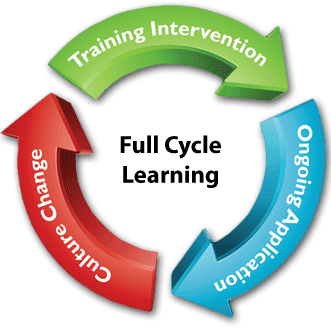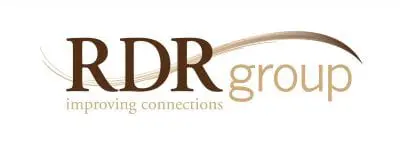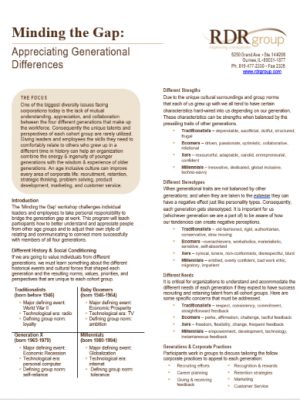Successful organizations seek to combine the energy and ingenuity of younger generations with the wisdom and experience of older generations. In this workshop, participants will gain the skills needed to comfortably relate to people of all ages and will be challenged to take personal responsibility for bridging the generation gap at work.




Successful organizations seek to combine the energy and ingenuity of younger generations with the wisdom and experience of older generations. In this workshop, participants will gain the skills needed to comfortably relate to people of all ages and will be challenged to take personal responsibility for bridging the generation gap at work.
KEY TAKEAWAYS
Identify various needs across generations by understanding the history and social conditioning of each cohort group.
Understand the values and strengths of each generation:
-
Traditionalists (pre 1946)
-
Boomers (1946-1964)
-
Xers (1965-1979)
-
Millennials (1980-1994)
-
Gen Z (1995-2012)
-
Create an inclusive culture that improves every area of corporate life from multi-generational recruitment to development and retention.
Formulate an action plan for implementing inter-generational practices to increase employee engagement for all generations.
Looking for a diversity course that covers generational gaps as well as gender, ethnic, religious, and lifestyle gaps? Explore our Culture Competency course.
KEY TAKEAWAYS
Identify various needs across generations by understanding the history and social conditioning of each cohort group.
Understand the values and strengths of each generation:
-
Traditionalists (pre 1946)
-
Boomers (1946-1964)
-
Xers (1965-1979)
-
Millennials (1980-1994)
-
Gen Z (1995-2012)
-
Create an inclusive culture that improves every area of corporate life from multi-generational recruitment, development, and retention.
Formulate an action plan for implementing inter-generational practices to increase employee engagement for all generations.
Looking for a diversity course that covers generational gaps as well as gender, ethnic, religious, and lifestyle gaps? Explore our Culture Competency course.



FOLLOW UP TOOLS FOR SUSTAINABLE LEARNING
One of the strongest features of the RDR approach is a commitment to creating sustainable learning. Many training efforts are simply one-time events that only provide temporary motivation but very little traction. We attempt to avoid this by focusing all our courses on measurable behaviors rather than a simple knowledge transfer or just checking a box.
Subsequently, in response to client’s requests, over the years we have developed a specific follow-up resource called the Full Cycle Learning Kit. These tools facilitate the integration of specific competencies into ongoing organizational practices and help “move the needle” around genuine culture change.



FOLLOW UP TOOLS FOR SUSTAINABLE LEARNING
One of the strongest features of the RDR approach is a commitment to creating sustainable learning. Many training efforts are simply one-time events that only provide temporary motivation but very little traction. We attempt to avoid this by focusing all our courses on measurable behaviors rather than a simple knowledge transfer or just checking a box.
Subsequently, in response to client’s requests, over the years we have developed a specific follow-up resource called the Full Cycle Learning Kit. These tools facilitate the integration of specific competencies into ongoing organizational practices and help “move the needle” around genuine culture change.











